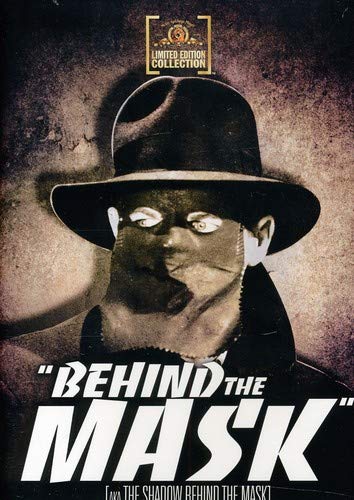
One of a number of films based on pulp magazine hero The Shadow, Behind the Mask (also known as The Shadow Behind the Mask) is the second of three films to star Kane Richmond as Lamont Cranston, a wealthy playboy who crusades as masked proto-superhero The Shadow at night. Richmond is a credibly smarmy womanizer, but he’s the only thing that sort of works in this Monogram B-picture. The dreadful screenplay by George Callahan based on Walter B. Gibson’s stories isn’t given any life by Phil Karlson, who would go on to direct some crackling low-budget noirs like Kansas City Confidential, but can’t seem to muster up anything of visual interest here.
As the film opens, we see crooked reporter Jeff Mann (James Cardwell) getting repaid in full for his numerous blackmail schemes as he’s murdered by a masked man. Witnesses in the newsroom identify the murderer as The Shadow, but it’s an impostor known as The Silhouette. This leads Cranston to try surreptitiously to prove his own innocence without revealing his identity. Not that there’s much urgency surrounding the matter, as Cranston seems more interested in flirting with every woman in his path. Never mind the fact that he’s engaged to Margo Lane (Barbara Reed), and the wedding date is the very next day.
Cranston’s pervasive caddish behavior makes it hard to care about him at all, but the shrill female caricatures — of which Margo is the worst — that surround him makes one wonder what he sees in any of these women at all. Perhaps even worse is the characterization of Shrevvie (George Chandler), Cranston’s dim-witted chauffeur, whose attempts to aid in the investigation push the film down an irretrievable path of broad, tiresome physical comedy.
The goofy tenor of Behind the Mask ruins any potential for pulpy thrills — the jokey approach to the material is just as detrimental as the half-assed plotting and one-note supporting cast. This thing wheezes to the finish line while barely clocking in over an hour, but it’s still not worth the nominal time commitment.
Chock up another strike against the film with MGM’s Limited Edition burn-on-demand disc, which approximates VHS quality for most of the running time. This is easily the worst disc I’ve seen from the line yet, with a muddy digital transfer that obliterates detail. Some low-light scenes are almost completely worthless because of it. While the source materials appear to be in decent shape considering the budget of the film, the transfer doesn’t do them justice. The mono audio fares slightly better, never escaping its tinny overtones, but at least remaining audibly comprehensible. The disc comes devoid of any extras.